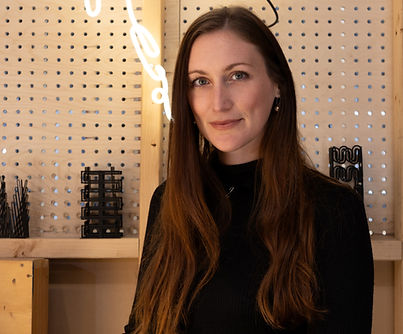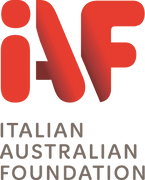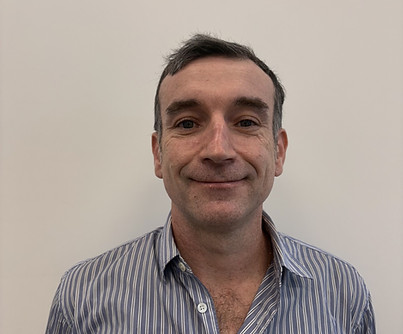
2025 Fellows
The George Alexander Foundation Fellows


Jordan Fleming
Reviving Lost Trades: Vitreous Enamel in Contemporary Australian Design
Jordan's Fellowship will explore the history and modern uses of vitreous enamel, aiming to reintegrate it into Australian design and manufacturing. Through collaboration with international artisans and industry leaders, the project will deepen knowledge of enamel techniques and production methods. Research in northern Europe will focus on enamel applications and contemporary techniques on alternative substrates, while engagement with global artist collectives will offer insights into modern interpretations. The Fellowship will refine technical skills, build industry connections, and foster local collaborations to preserve and evolve vitreous enamel in Australian Design.

Molly Younger
Natural Latex: Processing and Crafting
Molly’s Fellowship explores sustainable processing and manufacturing of natural latex, to be utilised within design and fashion practices to drive alternate ways of producing. The research intends to promote a sustainable approach to natural latex within a design and fashion practice, to prompt reflection and action. It aims to broaden the existing material range available within these industries in Australia, providing more alternatives to synthetic materials. Considering the inherent material characteristics of natural latex, the fellowship will encourage opportunities for new design methodologies. The Fellowship proposes visits to communities, producers, material laboratories, designers and leading researchers, specifically within the Amazon rainforest.

Lauren Crockett
Anti-Demolition: Learning from the Past, Adapting for the Future
Lauren’s Fellowship will explore methods for the maintenance and adaptation of existing buildings, in lieu of demolition. It will focus on the construction industry in Brussels, where forward-thinking approaches to preservation and circularity have become mainstream, thanks to a combination of policy shifts and the advocacy of individuals. Her research will investigate how construction teams navigate the complexities of retaining and adapting existing structures, balancing technical, economic, and regulatory challenges. By studying these methods first hand, she aims to develop an atlas of practical strategies that minimise resource consumption while preserving or enhancing architectural and cultural value.
.jpg)
Marlo Lyda
Circular Stone Revival: Harnessing Heritage Techniques for Sustainable Australian Design
Marlo Lyda’s Fellowship explores stone in its second life—a study of reuse, reinvention, and material storytelling across Italy, Spain, and the UK. Through hands-on workshops, she will investigate mosaic, terrazzo, and spolio, repurposing stone with age-old techniques. This isn’t about nostalgia but about redefining stone’s role in contemporary Australian design, testing its potential in furniture, interiors, and architecture. By merging traditional craftsmanship with modern material challenges, Lyda aims to shift perceptions of stone—bridging the gap between its extractive past and a more resourceful future.

Meagan Streader
Traditional Neon Fabrication: The Importance of Preservation in a Contemporary Setting
Meagan Streader’s Fellowship will explore the preservation of traditional neon fabrication through intensive training and international collaboration with master neon craftspeople. Her program combines sophisticated hands-on technical skills learning, alongside mentorship from pioneering artist Lili Lakich and members of the ‘She Bends’ collective. Through building international industry connections, this opportunity will enable her to establish education resources and video-based platforms to support skill-sharing across creative, conservation, and architectural sectors. Positioning neon as sustainable and adaptable, her project aims to embed traditional neon into local industries to ensure it has a thriving future in Australia.

Clara Chanisheff
Scent-based Storytelling: Bridging the Sensory and the Scientific
Clara Chanisheff’s Fellowship will investigate emerging methodologies in contemporary olfactory art with a particular focus on scent-based storytelling, immersive installation and the experimental integration of metabolomic scent data within creative practice. Engaging with international symposia and key laboratories, her research aims to develop cross-disciplinary frameworks that bridge the sensory and the scientific. Through collaboration with leading practitioners and researchers, Chanisheff will advance technical methodologies and extend conceptual frameworks for working with ephemeral and reactive materials. The Fellowship will contribute to the advancement of olfactory methodologies within artistic research and strengthen discourse at the intersection of art, science and sensory studies.
Sir James Gobbo Italian Australian Foundation Fellows


Irene Crusca
Viva L'Atelier: Reviving the classical tradition of portraiture
Irene aims to enhance her oil painting through training in the classic tradition of portrait painting at private art colleges in Florence, as well as undertaking private lessons. Irene will also engage in first-hand study of portrait masterpieces in the Uffizi, and the museums and churches of Florence, cradle of the Renaissance. As a professional painter with years of experience teaching art, she will be ideally positioned to share her newfound knowledge and skills. Irene hopes to counteract the deskilling of traditional oil painting and drawing in Australian visual art education and to support the demand for representational Australian art.

Luca Lana
Fresco restoration with traditional and sustainable materials
Melbourne architect and researcher Luca Lana is undertaking an international fellowship focused on restoration and craft skills, based at Palermo’s Palazzo Butera, an active restoration site. Training directly with the site’s restoration team and learning directly from lead architect Giovanni Cappelletti (formerly of Mario Bellini Architect). Learning priorities include fresco preparation and repair, conservation ethics, and the use of pre-war natural and sustainable building materials and techniques. Luca hopes to share this knowledge in Australia, both professionally and through academic institutions.

Marie-Lauren Romano
Fire, Form, and the Poetry of Surface: Reviving Italian Traditions in Jewellery and Ceramics
Marie-Lauren is a Melbourne-based multidisciplinary creative with over 20 years’ experience in fine art, design, and creative business. Her practice is grounded in her Italian heritage, a respect for natural materials, and a deep commitment to traditional handcraft. At its core lies a fascination with storytelling, symbolism, and the transformative potential of surface embellishment. Her Fellowship will explore the heritage and contemporary relevance of surface techniques across Italy’s jewellery and ceramics traditions. Focusing on enamelling and glazing, two fire-based processes that alter not only the surface of form but the emotional resonance of an object, she will investigate their creative and conceptual parallels. Through hands-on training in Florence and Rome, Marie will study with master artisans to preserve traditional Italian techniques while reimagining them within contemporary Australian design.
Mason Family Trust Fellows

_edited.jpg)
Rebecca Boehme
Stained Glass Painting and Restoration Research Project
In her Fellowship, Rebecca aims to research and report on European stained glass restoration and conservation techniques. Her main objectives are to study environmental protective glazing methods, to explore treatments for paint loss in Victorian-Era stained glass windows, and to learn traditional multi-layer traditional glass painting techniques. Rebecca will investigate these topics through hands-on work experience with world renowned glass studios both in Australia and York, England. At the conclusion of her fellowship, Rebecca will publish her findings and provide education on these skills through a series of presentations and workshops. The acquired knowledge and skills from this fellowship will further cement Rebecca's position as an acknowledged advocate for best practice stained glass restoration methods in Australia.

Cody Winward
Bringing Passementerie Back to the Goldfields
Cody Winward’s Fellowship focuses on preserving the endangered craft of Passementerie-the art of creating trim by hand including braids, fringes, buttons, rosettes and tassels. As Costume Manager at Sovereign Hill Museum Association, an immersive 1850’s experience, she has witnessed the diminishing supply of authentic trims as well as the importance of keeping rare trades alive. Through hands-on experience with the last few passementerie masters worldwide, she will bring back practical knowledge to enrich Australia’s costume and fashion landscape to aid in keeping this art form alive.
VSA International VET Practitioner Fellows
%20(1).png)

%20(1).png)

Tracy Pearce
Vocational Centres of Excellence: Applying global best practice to the Australian context of Health and Community Services.
Backed by the Victorian Government, Kangan Institute has launched the $60 million Health and Community Centre of Excellence (HACCOE) in Broadmeadows—a state-of-the-art facility setting a new benchmark in vocational education and training (VET) in Australia. Whilst designed to support the delivery of excellence in educational outcomes, HACCOE plays a key role in responding to the nation's growing health and community sector skills shortage and sets a new standard in innovative education delivery. In alignment with its ambitious vision, this fellowship will undertake a global exploration of leading Health and Community Centres of Excellence (CoEs), identifying international best practices, high-impact partnership frameworks between CoEs, government, and industry, and successful models of integration between vocational and higher education. The insights gained will inform strategies to ensure HACCOE’s long-term success as a transformative force in the VET landscape.

Paul Hrasko
Creating an International Best Practice Culture for Gender Equity in vocational education
As part of his ISS Institute Fellowship, Paul Hrasko will investigate the internationally recognised approaches to achieving gender equity in Vocational Education and Training (VET) across the Nordic countries. Renowned for their progressive policies and consistent leadership in global gender equality rankings, these countries offer valuable insights into dismantling barriers within vocational fields. Paul’s research will focus on inclusive teaching strategies that encourage gender-diverse participation. By translating effective Nordic practices to the Victorian context, the Fellowship will support the development of professional learning resources and strategic frameworks aimed at driving lasting, system-wide improvements. The findings will contribute to ongoing research, writing, and cross-sector collaboration to advance gender equity in VET.

Candace Van Der Krogt
Developing and Improving Sustainable Upholstery Training in Victoria
Candace’s Fellowship will focus on teaching sustainable methods in the upholstery industry, to train the next generation of Upholsterers with environmentally conscious materials and to revive the expert craftsmanship and skills involved in traditional upholstery. During her fellowship, Candace will attend training in England to learn these traditional methods from master craftsmen and to explore the sustainable materials for upholstery that are currently being used in Europe. Candace will then bring this research back to Australia and through the upholstery teaching program at Holmesglen and working closely with industry leaders in Victoria, these methods and materials will be explored, used and implemented, creating a more sustainable and beautiful future for the furniture industry.

Freyja Dixon
Strengthening flexible learning pathways in a community hub
Freyja's Fellowship will investigate how global adult education policy frameworks, networks and emerging ideas can improve the educational approaches of a locally-driven family learning hub in Melbourne. Freyja will travel to the European Association for the Education of Adults (EAEA) annual conference in Germany in June, where the theme is ‘flexible learning pathways’. Later in the year, Freyja will travel to East Africa for site visits and targeted networking with adult education organisations, leveraging contacts from within the UNESCO Institute for Lifelong Learning. This research aims to further the success of the Debney Meadows Community Hub (hereafter The Hub), a Learn Local Partnership Award-winning initiative that supports Culturally and Linguistically Diverse (CALD) families living in public housing. The Hub has helped increase participation in adult education amongst a traditionally under-served section of the population, namely mothers of East African origin who face multiple barriers to accessing education and training.

Faraz Khan
Teaching the future: Integrating cybersecurity into education
This Fellowship explores how leading nations train teachers to integrate cybersecurity into curricula. By examining teacher training programs in countries with established cybersecurity education, it will identify best practices in cyber readiness training for educators. The insights gained will help strengthen cybersecurity education in Australia’s vocational education and training (VET) sector. The goal is to equip teachers with the skills to teach digital safety and reinforce cybersecurity principles, creating a more cyber-aware workforce. This research will contribute to improving cybersecurity education and training for Australian teachers and students alike.

Engela Van Der Klashorst
Developing inclusion strategies to support the success of students from a disadvantaged background
The Fellowship is aimed at expanding the current support provided to from disadvantaged backgrounds to access and engage in VET opportunities. Even though Australia provides increased access to training through government programs like the Skills First, Free TAFE program, the fellowship intends to explore inclusive strategies used in Finland and Sweden that prioritise equity over equality, in order to develop an individualised person-centred approach of support in which the learning and social support of students are integrated. Through co-design and collaboration with RTO staff and students, the fellow will work to identify strategies to develop individualised training plans that cater to diverse needs, beyond disability access plans currently available in Victoria.

Melanie Reynolds
Care Without Attachment: Building Resilience in Vocational Educators to Support Inclusive Learning, Enhance Job Satisfaction and Retention, and Improve Student Outcomes
This Fellowship explores international models that support vocational educators in maintaining emotional boundaries while providing compassionate, student-centred care. The concept of care without attachment promotes empathetic engagement without compromising educator wellbeing, a growing need in the VET sector as student mental health challenges and learner diversity become more visible and complex. Through an applied research tour of leading institutions globally, this Fellowship will investigate frameworks that foster educator resilience, emotional sustainability, and inclusive teaching practices. These insights will inform the development of professional learning resources and strategies tailored to the Victorian VET context, supporting both educator retention and student success.

Stephen Connolly
Fellowship in Technologically Advanced Eco-friendly Sports Turf Solutions
This International VET Practitioner Fellowship focuses on the implementation of eco-friendly sports turf solutions to reduce water consumption and minimize the use of harmful chemicals whilst maintaining optimal turf health and aesthetics. In particular, the use of innovative, data and technological-driven approaches will be researched to analyse the best practices globally which will assist Victorian sports turf students and managers to incorporate the latest technological advancements locally. The Fellowship's main aim is for intensive and applied research to inform and have a positive impact on the way that sports turf management is taught in Victorian TAFE's to help conserve water, inform selection of drought-tolerant turf varieties and limit harmful chemical use.

Nicola Russell
Building Digital and AI Confidence in the VETDSS Sector through Not-for-Profit RTOs
Nic Russell’s Fellowship addresses the digital and AI capability gap within small to medium Not-for-Profit RTOs, particularly those delivering VET to Secondary Students (VETDSS). Through international site visits across Scandinavia and the UK, alongside national engagement, Nic will investigate effective approaches to digital integration and AI in education. Findings will be compiled into an accessible online platform that collates free and low-cost training, case studies, and links to relevant websites and online content showcasing relevant information. The platform will strengthen educator confidence, build skill capability, and support organisations with limited resources in onboarding and embedding digital and AI knowledge.

Jeremy Rose
Future-ready vocational skills for the construction and built environment sectors
This Fellowship investigates vocation education policy makers, Tafes, and trainers respond to rapid changes in technology. It will deliver insights into how the Victorian VET system can remain current and deliver future-ready vocational skills for the construction and built environment sectors, with a particular focus on the impact of digital disruption and the transition to a clean and circular economy. Jeremy will explore how leading countries are: •Upskilling existing tradespeople to work in digitally enabled, low-carbon construction environments. •Creating new entry pathways for young people and career changers into trades and technical occupations. •Ensuring training providers remain up to date with industry needs, especially in digital tools (e.g. BIM, offsite manufacturing, digital twin technologies) and sustainability standards.

Emma Freitas
Exploring best practice in language learning combined with parenting support for migrant families.
Emma is a highly experienced Early Childhood Educator and more recently, a teacher of English as an additional language (EAL). Emma’s Fellowship will address how migrant learners can be supported in raising children in Australia, while also learning English. The Fellowship will explore models of language learning combined with parenting support overseas, while also gathering data from migrant families in Australia to learn from their direct experiences. The findings will be shared with policy makers and course developers to consider programs that support migrant families. Education on the importance of Early Childhood can improve outcomes for children and improve staff shortages in the ECEC sector.
